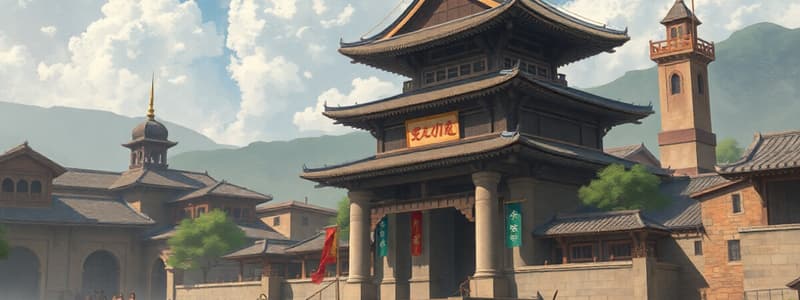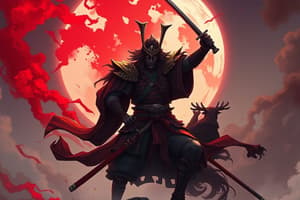Podcast
Questions and Answers
In Japan's feudal system, the powerful leaders at the top were the ______ and daimyo.
In Japan's feudal system, the powerful leaders at the top were the ______ and daimyo.
shoguns
The samurai fought for the shogun and daimyo in exchange for ______ and honor.
The samurai fought for the shogun and daimyo in exchange for ______ and honor.
support
The belief system of Islam emphasizes that there is only one ______.
The belief system of Islam emphasizes that there is only one ______.
God
Muslims practice the Five Pillars of Islam, which includes prayer, fasting, almsgiving, and a ______ to Mecca.
Muslims practice the Five Pillars of Islam, which includes prayer, fasting, almsgiving, and a ______ to Mecca.
Historians study human-environment interaction to understand what issues mattered at a given ______.
Historians study human-environment interaction to understand what issues mattered at a given ______.
Movement as a theme in geography considers how ______, places, and ideas have changed location.
Movement as a theme in geography considers how ______, places, and ideas have changed location.
Córdoba became an important economic center due to the presence of Muslim, Christian, and Jewish ______.
Córdoba became an important economic center due to the presence of Muslim, Christian, and Jewish ______.
In Córdoba, scholars translated works from Muslim scholars into ______.
In Córdoba, scholars translated works from Muslim scholars into ______.
Much of European medical knowledge came from these translated ______.
Much of European medical knowledge came from these translated ______.
Scholars translated ancient Greek texts into ______ after they had been translated into Arabic.
Scholars translated ancient Greek texts into ______ after they had been translated into Arabic.
The texts of ancient Greeks contained knowledge of science, mathematics, and ______.
The texts of ancient Greeks contained knowledge of science, mathematics, and ______.
The dynastic cycle had several stages: a new dynasty came into power with a mandate from ______.
The dynastic cycle had several stages: a new dynasty came into power with a mandate from ______.
Students might choose ______ for his strong leadership and the way he helped the empire grow.
Students might choose ______ for his strong leadership and the way he helped the empire grow.
In Japan, different clans and leaders fought until one leader came to ______ and unified the country.
In Japan, different clans and leaders fought until one leader came to ______ and unified the country.
In Korea, the Silla kingdom overpowered the others and unified ______.
In Korea, the Silla kingdom overpowered the others and unified ______.
Vietnamese rebellions became successful when the Chinese ______ dynasty weakened.
Vietnamese rebellions became successful when the Chinese ______ dynasty weakened.
The move of the Roman capital to __________ challenged various belief systems.
The move of the Roman capital to __________ challenged various belief systems.
The Western Roman Empire became vulnerable to attacks from the north and __________.
The Western Roman Empire became vulnerable to attacks from the north and __________.
The shift in power moved the center of influence on the Mediterranean more to the __________.
The shift in power moved the center of influence on the Mediterranean more to the __________.
The distance between the western and eastern branches of the Christian church contributed to the __________ of the church.
The distance between the western and eastern branches of the Christian church contributed to the __________ of the church.
Because of the hajj, Muslims from diverse cultures traveled to __________.
Because of the hajj, Muslims from diverse cultures traveled to __________.
Contact with Arab traders led to the development of the __________ language in East Africa.
Contact with Arab traders led to the development of the __________ language in East Africa.
The Bantu migrations contributed to the development of several great __________ in Africa.
The Bantu migrations contributed to the development of several great __________ in Africa.
Islamic ideas about government and law began to influence __________ African government officials.
Islamic ideas about government and law began to influence __________ African government officials.
Flashcards
Feudal System
Feudal System
A social and political system where power was based on a network of relationships between lords and vassals.
Shogun
Shogun
The military leader of Japan in the feudal system, holding the highest power.
Daimyo
Daimyo
Wealthy landowning lords who were powerful figures in the feudal system.
Samurai
Samurai
Signup and view all the flashcards
Five Pillars of Islam
Five Pillars of Islam
Signup and view all the flashcards
Human-Environment Interaction
Human-Environment Interaction
Signup and view all the flashcards
Movement
Movement
Signup and view all the flashcards
Córdoba's Importance
Córdoba's Importance
Signup and view all the flashcards
Constantinople's Impact
Constantinople's Impact
Signup and view all the flashcards
Hajj's Geographic Impact
Hajj's Geographic Impact
Signup and view all the flashcards
Arab Influence on East Africa
Arab Influence on East Africa
Signup and view all the flashcards
Bantu Migrations' Significance
Bantu Migrations' Significance
Signup and view all the flashcards
Western Roman Empire Weakening
Western Roman Empire Weakening
Signup and view all the flashcards
Byzantine Empire's Rise
Byzantine Empire's Rise
Signup and view all the flashcards
Cultural Exchange and Influence
Cultural Exchange and Influence
Signup and view all the flashcards
Christian Church Division
Christian Church Division
Signup and view all the flashcards
Dynastic Cycle
Dynastic Cycle
Signup and view all the flashcards
Mandate of Heaven
Mandate of Heaven
Signup and view all the flashcards
How did the Dynastic Cycle Work?
How did the Dynastic Cycle Work?
Signup and view all the flashcards
Roman Ruler's Impact
Roman Ruler's Impact
Signup and view all the flashcards
Unification in East Asia
Unification in East Asia
Signup and view all the flashcards
Japanese Unification
Japanese Unification
Signup and view all the flashcards
Korean Unification
Korean Unification
Signup and view all the flashcards
Vietnamese Unification
Vietnamese Unification
Signup and view all the flashcards
Study Notes
Japan's Feudal System
- Shogun and daimyo (military leaders and wealthy landowners) were powerful
- Samurai warriors fought for them, gaining power and honor
- Peasants, artisans, and merchants pledged loyalty and were protected
- Feudal system was a complex network of relationships
Islam's Belief System
- One God (Allah) and Muhammad as prophet
- Qur'an is God's word, revealed to Muhammad
- Sunnah (Muhammad's words and deeds) guides proper living
- Five Pillars of Islam: prayer, fasting, almsgiving, pilgrimage to Mecca
Historical Themes in Geography
- Human-Environment Interaction: How people are affected by their environment (and vice versa)
- Movement: How people, places, and ideas move from one place to another (e.g., trade routes, migration)
Córdoba's Economic Significance
- Muslim, Christian, and Jewish scholars lived in Córdoba
- Scholars translated Muslim works (medicine, mathematics, geography) into Latin
- Included ancient Greek texts (science, mathematics, philosophy)
Dynastic Cycle in Chinese History (Example)
- New dynasties gain power with mandate of heaven
- Dynasties weaken due to internal or external pressures (e.g., disasters, invasions)
- Weak dynasties lose mandate from heaven
- New dynasty establishes power through overthrow
Science and Technology in Roman History
- Students may select a Roman ruler and discuss long-term and short-term effects of their rule
- Consider comparing the ruler to two other rulers from a similar time period.
Unification of Japan, Korea, and Vietnam
- Military strength was crucial in unifying these countries.
- Differences in leadership styles and outside influences.
Belief Systems Challenges (Roman Capital Shift)
- Weakening of the Western Roman Empire
- Shift of power toward the East (Byzantine Empire)
- Cultural exchange between East and West
- Religious divisions (e.g., Schism)
Geographic Impact of the Hajj
- Hajj (pilgrimage to Mecca) brought people together from various cultures
- Shared knowledge and ideas, contributing to unity within Muslim empire
Arab Influence on East African Economy
- Swahili language development
- Spread of Islam through trade and cultural exchange
- Introduction of writing systems
- Increased trade between Africa and Asia.
Studying That Suits You
Use AI to generate personalized quizzes and flashcards to suit your learning preferences.
Related Documents
Description
Test your knowledge on Japan's feudal system and the foundational beliefs of Islam. Explore the roles of shoguns, samurais, and peasants, while also understanding the significance of the Qur'an and the Five Pillars of Islam. This quiz covers historical themes and the economic impact of Córdoba as a cultural hub.




